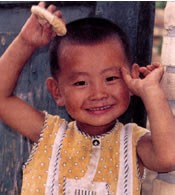Gaiji in China

Photo Source:
Copyrighted © 2026
Operation China, Asia Harvest All rights reserved. Used with permission |
Send Joshua Project a map of this people group.
|
| People Name: | Gaiji |
| Country: | China |
| 10/40 Window: | Yes |
| Population: | 40,000 |
| World Population: | 40,000 |
| Primary Language: | Chinese, Mandarin |
| Primary Religion: | Ethnic Religions |
| Christian Adherents: | 0.00 % |
| Evangelicals: | 0.00 % |
| Scripture: | Complete Bible |
| Ministry Resources: | Yes |
| Jesus Film: | Yes |
| Audio Recordings: | Yes |
| People Cluster: | Tibeto-Burman, other |
| Affinity Bloc: | Tibetan-Himalayan Peoples |
| Progress Level: |
|
Introduction / History
We know very little about the history of the Gaiji people and how they relate to other Yi groups in southern China. Even Gaiji children no longer have oral traditions and legends handed down to them.
The Gaiji are one of the more assimilated of the 120 ethnic groups that have been combined by the Chinese authorities to form the official Yi nationality. The Gaiji are a little-known people. They have never before appeared on ethnolinguistic lists of China's peoples.
What Are Their Lives Like?
According to one researcher, the Gaiji "retain their folk-dances, certain festivals, and religious beliefs. These, however, along with their bloodline, are the only factors separating them from the pervasive Han culture." Gaiji weddings are traditionally very relaxed. Once a couple decides they are ready for marriage, they choose a day to go farther into the mountains and chop firewood together. The bride "bears the firewood on her back as the two return to the groom's home to meet his parents. The bride then works for the groom's parents for two or three days. After her work is done, the two leave for the home of the bride. At the bride's home the groom engages in conversation with the bride's parents; by and by he leaves with the family water buckets balanced on his shoulders with a bamboo rod. If he is able to return with full buckets and empty them into the household crock without spilling any water, he is considered a capable candidate for marriage and knows that he has been accepted by his new in-laws. As soon as the couple returns to the home of the groom's family, the two are considered married."
What Are Their Beliefs?
Few Gaiji under the age of 30 have any religious beliefs. Most elderly Gaiji retain some vestiges of ancestor worship, Daoism and animism. In the past, the Gaiji were a very superstitious people, but their beliefs have gradually eroded as have their culture and language.
Often when tribal peoples assimilate to Chinese culture and language it affords them a better chance of hearing the gospel, but in the case of the Gaiji, this has not occurred because the Chinese living in the Gaiji area, Yunxian County, are also unreached. There may be a very small number of professing Han believers in the county seat, which is the main administrative town, but they are not known to be outward-looking in their faith.
What Are Their Needs?
The small number of Gaiji people following Jesus is primarily because of lack of access. They need gospel efforts that seek to connect them with their culture and religion, not to tear them further away.
Prayer Points
Ask God to open their eyes, hearts and ears to the good news of the savior.
Pray for the Lord to raise up the right people to disciple the Gaiji in his ways.
Pray for the Lord to demonstrate his power and goodness among them in a way they will understand.
Ask for an intervention of the Holy Spirit.